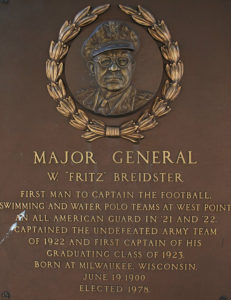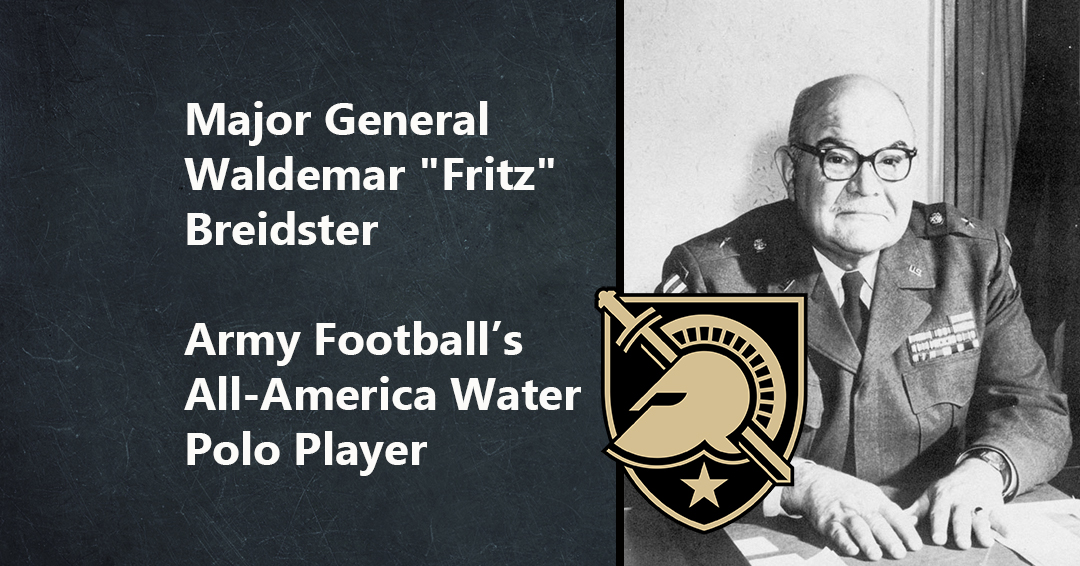BRIDGEPORT, Pa. — In the history of college football and water polo, the name Waldemar “Fritz” Breidster is likely not commonly known. However, the 1923 United States Military Academy graduate holds a special place in history for his time at West Point and for his role in winning World War II.
Born on June 19, 1900 and raised in Milwaukee, Wisconsin, Breidster graduated from East Division (Riverside) High School. After a year at the University of Wisconsin, he enrolled at the U.S. Military Academy and made his mark.
A member of the Army football, swimming and water polo teams, he captained the 1922 football team which went undefeated by compiling an 8–0–2 record. Army shutout seven of their ten opponents (Lebanon Valley College, 12-0 W; Springfield YMCA, 35-0 W; the University of Kansas, 13-0 W; the University of New Hampshire, 33-0 W; St. Bonaventure University, 53-0 W; Bates College, 39-0 W) to go along with defeats of Auburn University (19-6 W) and the United States Naval Academy (17-14 W) and ties versus Yale University (7-7 T) and the University of Notre Dame (0-0 T). Overall, Army outscored its opponents by a combined total of 228 to 27 – an average of 22.8 points scored and 2.7 points allowed.
Breidster, who started five games at left guard and one at right guard as Army’s first-string players only started versus the Springfield YMCA, Kansas, Auburn, Yale, Notre Dame and Navy, joined center Edgar Garbisch in claiming First Team All-America honors in 1922. For his performance, Garbisch was later inducted into the College Football Hall of Fame, while Breidster earned another level of glory during wartime.
Elected Cadet Captain of the academy – the highest office that can be given to a cadet – Breidster captained the football, swimming and water polo teams as a senior at Army to rate as the only athlete to captain three teams at the institution.
A first-team All-America selection at the guard position by Athletic World magazine (selected by 214 coaches), Chicago Tribune writer Walter Eckersall and Frank G. Menke, he was also selected by Billy Evans for his 1922 National Honor Roll (a selection of the best football players based on the votes of 200 sports editors). The award marked his second All-America nod after claiming recognition in 1921 from Jack Veiock of the International News Service Sports Editor
After graduating from West Point in 1923, Breidster was assigned to the football coaching staff at Fort Mead in Maryland where he and Dwight Eisenhower were both assistant coaches.
He served for five years in the regular army then resigned his army commission to enter private business. At the same time, he accepted a commission as captain of artillery in the Wisconsin National Guard.
However, World War II brought him back into active service where he earned the Legion of Merit and Oak Leaf Cluster.
In 1943, Breidster became the Commander of the 173rd Field Artillery Group, comprising five battalions. Later that year, he was assigned as a liaison officer with the Chinese Army of India, and eventually became Chief of Staff of the Chinese combat command. He directed the construction of a road through Burma that was completed in August 1945.
Breidster remained active in the Wisconsin National Guard after World War II, attaining the rank of Brigadier General in 1947. He was later promoted to Major General and retired from military service in 1960. A 1978 inductee to the Wisconsin Athletic Hall of Fame, he passed away on April 2, 1982.





